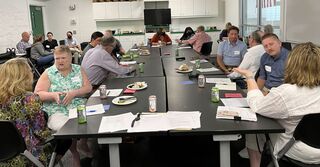Politics
Overcoming Political Hate and Polarization
A non-profit uses counseling techniques to build greater understanding.
Posted September 1, 2022 Reviewed by Vanessa Lancaster
Key points
- Polarized politics in America have divided our families, communities, and democracy.
- A non-profit brings "red" and "blue" citizens together, building relationships to bridge the divide.
- Using key strategies from Rogerian listening and couples counseling, participants discover common ground.

For the past few years, polarized politics in America have divided our families, our communities, and our democracy. Too many Republicans and Democrats see each other as enemies, leading to suspicion, hostility, and even violence.
According to University of Minnesota psychologist Bill Doherty, members of the two political parties are “like two parents in a family.” Republicans and Democrats “cannot simply walk away from each other,” he said. “Neither side can ‘divorce’ and move to a different country.”
As parents remain responsible for their children, members of both parties remain responsible for the health of the country (Doherty, 2021). Doherty is co-founder of Braver Angels, a non-governmental organization that works to bridge the current political divide.
After the 2016 election, two of Doherty’s colleagues, David Blankenhorn, a Democrat or “blue” from the Upper East Side of Manhattan, and David Lapp, a Republican or “red” from Southwest Ohio, told him how people in their parts of the country were feeling.
Doherty said, “In Manhattan, it was gloom and doom, the world was ending, and in southwest Ohio, it was hope, change, a fresh start.”
In early December of 2016, the three decided to get 10 Hillary Clinton and 10 Donald Trump voters in southwest Ohio together for a weekend workshop to “talk to each other, not just about each other.” Doherty designed and facilitated the event. The workshop was such a powerful experience that the group asked for a reunion and didn't want to stop meeting. “We decided that we had to keep going,” Doherty said, “and that's how it all got started” (Doherty, 2022).
Since then, Bill Doherty and his colleagues have used group process and couples counseling techniques to bring reds and blues together all over the country. Their goal, he said, is to promote greater understanding, “to bridge the partisan divide, not to create centrist politics. We’re not trying to say everybody should be moderate.”
People can be deeply conservative, deeply liberal, or in the middle. The goal is “humanizing one another, and not demonizing one another over our differences,” he said. “We’re working on people’s relationships with each other, bridging the relational divide.”
The movement began with “Better Angels,” based on Abraham Lincoln’s appeal to the “better angels of our nature” in his first inaugural address. The name was later changed to “Braver Angels,” emphasizing the courage it takes to bridge the divide.
Why has America become so polarized?
There are many reasons for the increased polarization in America. Doherty said that “political identity has become a major aspect of personal identity in the 21st century, in a way that religious identity used to be.” According to Doherty, “we have come to see ourselves as members of non-overlapping tribes.”
The media contributes to this polarization. Most of us now get our information from left- or right-slanted cable news instead of watching more balanced network news programs as we did decades earlier. Then there’s the clamor of social media and what Doherty called “conflict entrepreneurs, people who make their living using various megaphones to tell us that the people on the other side are evil and not to be trusted.”
Structural changes in government have also contributed to polarization.
- As Doherty explained, all new congressional representatives used to go to the same orientation meeting, where they learned the rules and procedures. Now Republicans and Democrats take separate buses to separate orientation meetings.
- Years ago, most congressional representatives stayed in Washington when Congress was in session and often had dinner together. Many now pack their congressional work into Tuesday, Wednesday, and Thursday, returning home on weekends. Rushing from one meeting to the next, they have no time to break bread and socialize and build relationships and trust with their colleagues across the aisle. The stress of constant rushing can make us defensive, shutting down our capacity for greater trust and understanding (Darley & Batson, 1973; Dreher, 2015).
- Increased Gerrymandering has changed many congressional districts to predominantly red or blue. To get reelected, a member of Congress has to worry about alienating people on their side, especially the extreme base. One member of Congress told Bill Doherty that “if there was a photo taken of him shaking hands with a member of the other party in Congress, that could appear on social media and he could be “primaried,” with a member of his party running against him because he’d be seen as “consorting with the enemy.”
Reaching Across the Divide

Braver Angels members have been reaching out on many levels to bridge the divide: working with couples, families, election officials, state legislatures, and the United States Congress.
Bill Doherty works with couples divided by red and blue politics. Braver Angels offer advice on communicating to families divided by politics, which can be especially helpful at holiday gatherings.
Reaching out politically in a project called Braver Politics, Braver Angels has given workshops for city council members and mayors in Minnesota. They held a workshop on “Managing Difficult Conversations with Constituents” for North Carolina County Commissioners, offering them strategies for communicating with disgruntled constituents.
They have worked with the New Hampshire Secretary of State, offering nineteen workshops across the state for Election Day officials on managing upset voters. Their workshop for red and blue members of the New Hampshire state legislature was so powerful that Braver Angels was asked to be part of the orientation for all incoming state legislators.
Braver Angels have gone to Congress, working with the thirty Democrats and thirty Republicans of the Problem Solvers Caucus. To deepen relationships across the aisle, they’ve offered workshops asking about what life experiences influenced participants’ values and beliefs about public policy and public service.
After time for silent reflection, every member would have five uninterrupted minutes to share a formative experience from their past. Doherty said, “They go deep, losses and deaths and heroes and heroines and their family and Holocaust survivors.”
Then participants are asked about the implications of these insights for reducing polarization and improving the function of Congress. Doherty said that “one Republican representative who had introduced himself by saying, ‘I'm as conservative as they come,’ said after this exercise, ‘You can't fight somebody in the same way when you know their heart.’”
Strategies for Building Bridges
Participants in Braver Angels programs learn to listen carefully to people on the other side, look beyond stereotypes, speak from their own experiences, and search for common ground.
- Listening. Braver Angels moderators establish a workshop structure where participants agree to listen and not interrupt each other, using strategies from counseling psychology and Rogerian listening (Rogers, 1961, 1987).
- Finding Common Ground. Careful listening leads to greater understanding and finding common ground. Doherty said, "When we listen carefully to people who are different from us, we come to see them as having goodwill and some complexity of thinking. And we find something we can agree with, even if it's a small thing, for instance, we want our children to be well educated, even though we differ on the means."
In a practice drawn from couples therapy, participants are asked to reflect on their core values and recognize how their attitudes and actions may have contributed to difficulties relating to each other (Benson et al., 2012)
- Braver Angels' facilitators ask the first question: "Why are your side’s values and policies good for the country?” This allows people to articulate some of their core values and beliefs. As Doherty explained, "A red conservative capitalist might say how free enterprise capitalism has lifted billions of people out of poverty and helped them flourish. A blue liberal might talk about social justice, how creating a level playing field helps people have a fair chance to succeed."
- The second question participants are asked is, “What are your reservations or concerns about your side?” In couples therapy, answering these questions brings forth humility as each person sees how they have been contributing to a dysfunctional pattern in the relationship.
Moderators ensure that participants discuss only their limitations without accusing the other side. In red/blue workshops, people on each side develop humility by acknowledging their own side’s limitations. “What this humility elicits,” Doherty said, “is reciprocity. If I am introspective and appropriately self-critical, it invites you to be.”
Results
While working out at my local gym, I talked with a woman on the treadmill beside me who complained about high taxes and government regulation. I’m a blue and thought to myself, “She sounds like a red. Here’s an opportunity.” I said, “That's interesting. Could you say more about that?” and just listened.
When she complained about the high price of prescription drugs and that so many generic drugs are not made in this country without sufficient quality control, I said, “You're right. That's a real problem.”
We found common ground and decided to call our congressional representative at her next telephone town hall meeting. At the meeting, my gym partner shared her concerns about the issue. And then I shared mine. After the town hall, our congressional representative introduced a bill to investigate generic drugs.
The next time I went to the gym, my red colleague and I high-fived each other. We became friends. My experience shows that even when applied in a very simple way, Braver Angel strategies can break through polarization and help us find common ground, build relationships, and take positive action together.
Recent research has shown that Braver Angels' red/blue workshops significantly reduce polarization among people (Baron et al., 2021). And there are many examples. Bill Doherty tells of a very polarized blue man who initially said that as a landlord, he would not rent to someone red.
But later, after a Braver Angels workshop, with tears in his eyes, he told Bill Doherty about how he was talking with a red, who said something he disagreed with. He had responded, “You know, I'm a blue. I disagree with what you said. But powerful people out there want us to hate each other. Let's not do it.”
Let’s not do it. As Braver Angels show us, there is a better way.
This post is for informational purposes and should not substitute for psychotherapy with a qualified professional.
© Diane Dreher, Ph.D. 2022 All rights reserved.
References
Baron, H., Blair, R., Choi, D. D., Gamboa, L., Gottlieb, J., Robinson, A. L., … West, E. A. (2021, May 10). Can Americans depolarize? Assessing the effects of reciprocal group reflection on partisan polarization. https://doi.org/10.31219/osf.io/3x7z8
Benson, L. A., McGinn, M.M., & Christensen, A. (2012). Common principles of couples therapy. Behavior Therapy, 43, 25-35.
Braver Angels. (2022). Information on their approach, programs, and local contacts can be found on https://braverangels.org/our-story/
Darley, J. M. & Batson, C. D. (1973). “From Jerusalem to Jericho”: A study of situational and dispositional variables in helping behavior. Journal of Personality and Social Psychology, 27, 100-108.
Doherty, W. (2022). Personal communication. August 24, 2022. Unless otherwise noted, all quotes from Bill Doherty are from this source.
Doherty, W. (2021). Couples therapy principles in the design of the Braver Angels Red/Blue workshop. https://braverangels.org/couples-therapy-principles-in-the-design-of-the-braver-angels-red-blue-workshop/
Dreher, D. E. (2015). Leading with compassion: A moral compass for our time. In T. G. Plante (Ed.). The psychology of compassion and cruelty: Understanding the emotional, spiritual, and religious influences (pp. 73-87). Santa Barbara, CA: ABC-CLIO.
Rogers, C. R. (1961). On becoming a person. Boston, MA: Houghton Mifflin.
Rogers, C. R. (1987). The underlying theory: Drawn from experience with individuals and groups. Counseling and Values, 32, 38-46.




